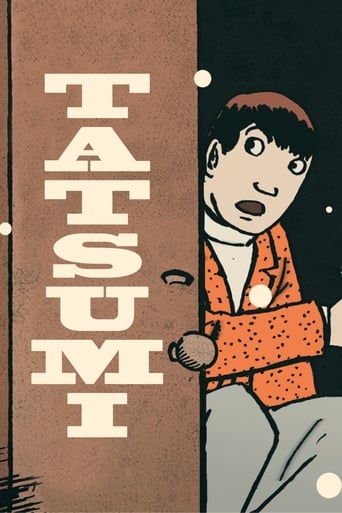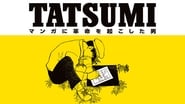hayashimegumi
Tatsumi (2011) explores human nature and it is as dark as it is serious. The visuals are simple and straightforward yet everlasting due to its distinctive style. With many experimental narrative scenes in this animated feature, the overall plot can be puzzling but each scenes have their own message on social issues and they are undeniably powerful.(Those who are not aware that this animated feature is a tribute–a biographical drama film with five fictional short stories based on the life and work of Yoshihiro Tatsumi–might be confused)In brief, we will get to know a little about the manga master and some of the struggles he has to face until he became a renowned manga artist that coined the term gekiga (dramatic pictures) from the biography part. As for the short stories, they are mostly sad, tragic, horrific and depressing even though it is psychologically realistic because there are many dark elements such as destruction, pressure, grief, lust and many more! Ending this review, Tatsumi (2011) is undeniably a great tribute and it is the best from Singapore. There is a little surprise at the end of the animated feature that will leave us all nothing but amazed. If you do watch this, you will agree with me that the whole animation feels like line art or gekiga coming to life due to the impressive drawings by the manga master himself and the direction of this animated feature makes it feel even more surreal.
Howard Schumann
Directed by Eric Khoo, Tatsumi explores the life and work of the celebrated manga artist Yoshihiro Tatsumi who created the gekiga style of alternative comic books for adults. Animated in Indonesia with Japanese dialogue and based on Tatsumi's 800-page memoir "A Drifting Life" and other works, the film was shown in the Un Certain Regard section at this year's Cannes Film Festival and has been selected as the Singaporean entry for Best Foreign Language film at the Oscars.It depicts five different historical periods in Japanese history and dramatizes five stories of post-war Japan: "Hell", "Beloved Monkey", "Just a Man", "Good-Bye" and "Occupied." These stories with their adult content that includes sex and violence are reported to have drastically altered the medium in Japan.Tatsumi is the narrator of his own biography and explains how he grew up in a dysfunctional environment with six other children. He began to draw as a child and was ten-years-old when the Second World War ended. When he was a teenager, he started to publish his work and describes a meeting with his idol, Osama Tezuka. Unhappy with the genre that restricted manga to children, he began to experiment with darker themes, designed to appeal to adults. Color is used for his bio and one story, while the others use a monochrome hue."Hell" is a bizarre story about a photographer covering the aftermath of Hiroshima and discovers two figures burned onto a wall, that of a boy apparently giving his mother a back massage before the bomb hit. He becomes rich from the sale of this picture until a twist undermines the whole idea. In "Beloved Monkey", a lapse in judgment by a factory worker results in an unwanted result for his pet monkey. An older worker decides to spend all of his savings on women in "Just a Man' but the consequences are not what he intended."Good-bye" tells the dark story of a prostitute who is abandoned by an American soldier and takes her anger out on her father. The final story, "Occupied" has a man obsessed with graffiti on the walls of public restroom, a story bordering on the offensive. Apparently, these themes are normal for Japanese manga but to a Western audience their appeal is dubious, although the narration by Tatsumi gives the film a feeling of authenticity. Beyond the questionable material, however, Tatsumi's stories may be commenting on the decay of Japanese society.
DICK STEEL
Singapore's track record with animation has been admirable but poor, with the earliest foray being production houses plunging headlong thinking computer generated graphics was the way to go, undoubtedly fueled by Pixar's success with the medium. But what was keenly forgotten, was that story remained king, which films like Zodiac The Race Begins, Legend of the Sea and surprisingly Sing to the Dawn, based upon an acclaimed book, all failed to come out with narratives to engage, passing off as really childish attempts with laughable artwork that paled in comparison to what it wanted to emulate.I suppose if Eric Khoo had opened the doors for the Singapore film community once before in generating buzz in the earlier days of our film renaissance (if I can call it that), then he's clearly doing that again by showing that animated films can be done by Singapore production teams, if done properly. Some may quibble with the fact that Tatsumi is an animated film done by animators who are largely based offshore, but I'd say to give credit when credit is due, especially when there's a significant, marked improvement from their animated film, without a doubt having found a project comfortable enough to play to the strengths of a small team.You would have known the background to how this film came about already, from the various press releases, interviews and articles ever since the film was slated to make its world premiere in Cannes earlier this year. In what would be a tribute to one of his idols, Eric Khoo had decided to venture into making not a live action film, but an animated one, adapting from the autobiography of Gekiga master Yoshihiro Tatsumi and his short stories, with the artist's blessings of course, and furthermore having to involve Tatsumi himself in providing additional inputs to bringing his creations to life on the big screen, especially helping to fill in the blanks behind where once were bubble speeches from his comic books, as well as imparting what would be key to the authenticity of the film - the keen eye for detail, so much so that this film is truly Japanese in spirit.For those uninitiated with Tatsumi's works, then this film will serve as that quick start guide to his visual style and the stories that he's told through the graphic medium, and in many ways you'd see why they are so appealing to filmmaker Eric Khoo, drawing (pardon the unintentional pun) parallels with the filmmaker and the artist since the former was also once a cartoonist himself, and the darker content, more adult tales that Tatsumi draws about. In some ways the narrative structure is similar to Khoo's earlier film Be With Me, where it tells the biographical tale of a remarkable individual, interspersed between other stories. Here the film adapts from Tatsumi's autobiographical manga A Drifting Life, an astounding 800+ pages worth that chronicles the artist's struggles and inspiration.One can imagine the sheer effort it took to condense that amount of material spanning decades of the master's life up (it was mentioned that he's working on the next volume that will culminate in his attendance at Cannes this year for the film's opening), and clearly that arc forms the core that engages, especially for anyone wanting to know more about the artist himself since major milestones are covered. But the short stories - Hell, Beloved Monkey, Just a Man, Good-Bye and Occupied - all provided that glimpse into the type of tales his art accompanied that he had pioneered, suited more for the adult with its darker tones and themes, graphic in nature too. And kudos to the director in knowing just when to make the transition between biography, and short story, at moments most apt that do not seem too jarring, nor confusing.The animation style, which looked a lot like simple cut out animation, played to the production house's strengths, where things are kept simple based on the artistry of Tatsumi himself, therefore having his books serving as natural storyboards, with the obvious understanding that the look and feel of the film cannot and should not venture too far that it doesn't look like what had been designed by its creator. It's a limitation and constraint that worked wonders for Infinite Frameworks Studios, and should go about exorcising the demons from its earlier animated film effort.Personally I would have loved to see more of Tatsumi's struggles in this movie, but the best way to do that is to go back to the source material. Hopefully this animated film will pique your interest in the master artist and his works, and if this film helps the casual viewer to pick up any of Tatsumi's books, and from there turn some into fans, then this film homage would have successfully done its job. Recommended! And yes do pick up the book as well!
Ayal Oren
It's not Manga as you might think of it, the design seems similar, especially the Japanese attitude that centers on the surrounding, the setting of the story and describes it with loads of care to every minute detail, while treating the human participants in the story almost as if they were an after thought. In a very generalize fashion that makes most people look almost identical (they usually vary in their hair style and clothing so we can tell them apart). This aspect of Manga is still here, but the stories are nothing like the romantic or sci-fi stories Manga lovers are so familiar with. Tatsumi is interested in the real life stories of real Japanese, or to be precise, among all the stories presented in this film there's a common thread - the interest in people that can't handle success, the only one among these treated in the movie that lives well with his success is Tatsumi himself (we get to see his autobiography in between the stories) and he himself says in the film how he hated all those success stories popping up all around him in the years of the great economic boom in Japan. If this was an American movie, we'd be speaking about losers (one of the terms I detest the most) but Tatsumi has no judgmental approach to people that can't handle success, he understands them and in fact likes them better than the success driven people around them. For these stories and for the novel approach to Manga, this movie is highly recommended even if I didn't think it was perfect.




